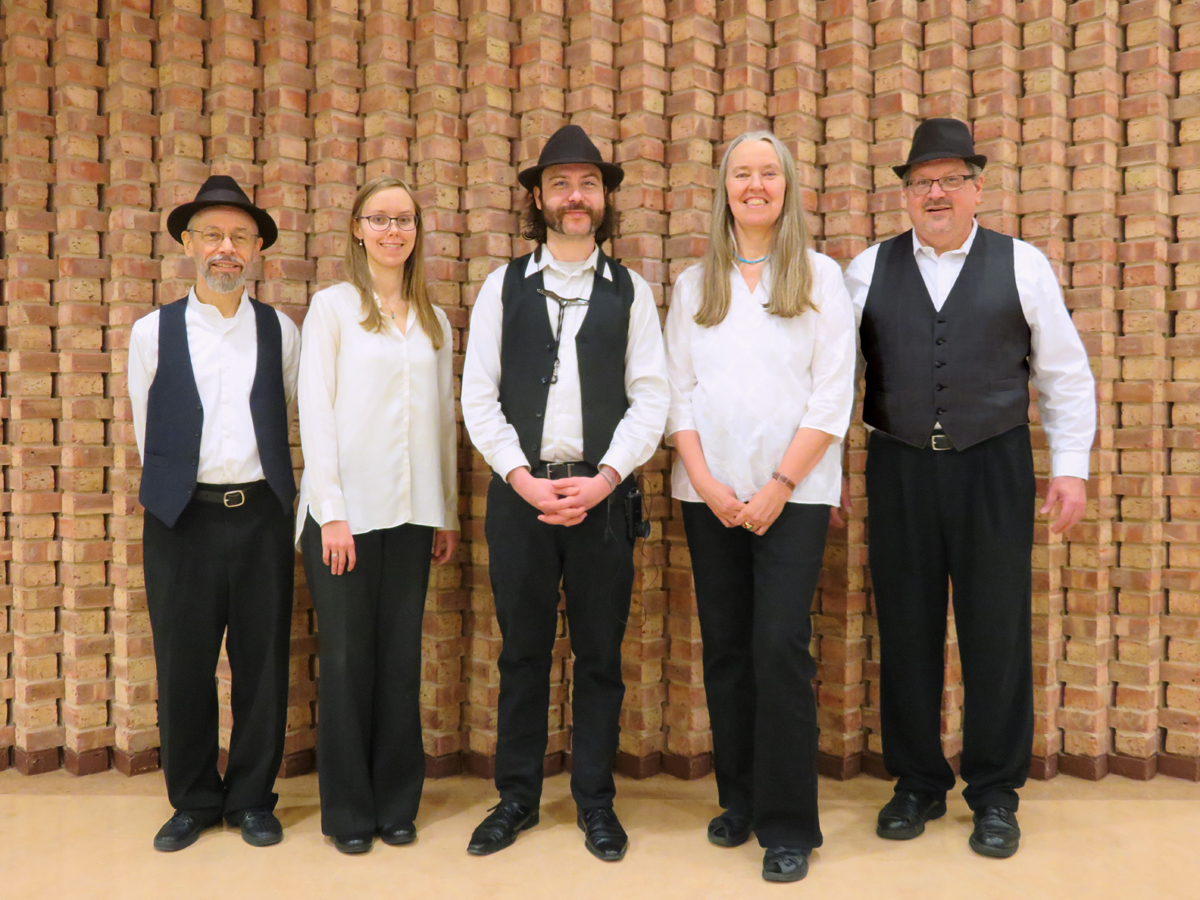MODAL MUSIC
World Music Bands
Event reviews
20th & 21st anniversaries
New Mexico Jewish Link Magazine, April 2010 clipping
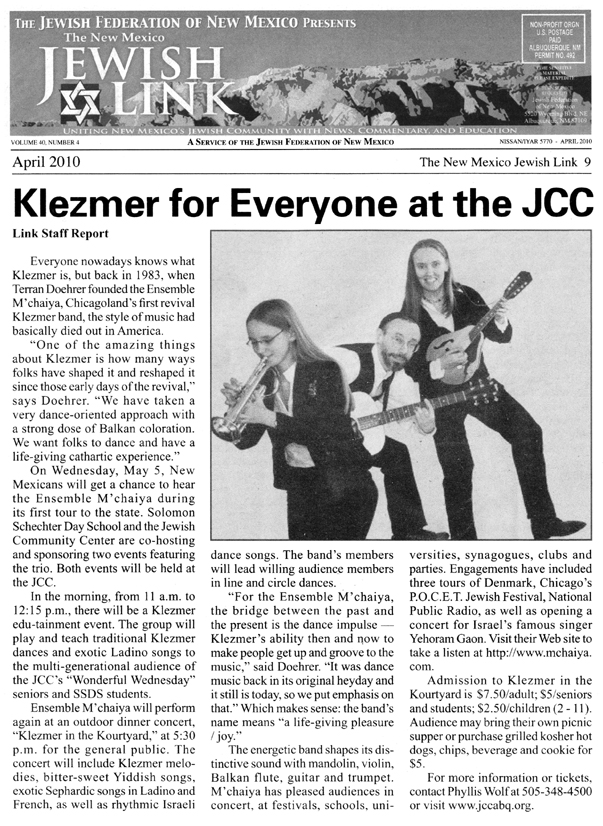
Klezmer for Everyone at the JCC
Everyone nowadays knows what Klezmer is, but back in 1983, when Terran Doehrer founded the Ensemble M’chaiya (tm), the style of music had basically died out in America.
“One of the amazing things about Klezmer is how many ways folks have shaped if and reshaped it since those early days of the revival,” says Doehrer. “We have taken a vary dance-oriented approach with a strong dose of Balkan coloration. We want folks to dance and have a life-giving cathartic experience.”
On Wednesday, May 5, New Mexicans will get a chance to hear the Ensemble M’chaiya during its first tour to the state. Solomon Schechter Day School and the Jewish Community Center are co-hosting and sponsoring two events featuring the trio. Both events will be held at the JCC.
In the morning, from 11 a.m. to 12:15 p.m., there will be a Klezmer edu-tainment event. The group will play and teach traditional Klezmer dances and exotic Ladino songs to the multi-generational audience of the JCC’s “Wonderful Wednesday” seniors and SSDS students.
Ensemble M’chaiya will perform again at an outdoor dinner concert, “Klezmer in the Kourtyard,” at 5:30 p.m. for the general public. The concert will include Klezmer melodies, bitter-sweet Yiddish songs, exotic Sephardic songs in Ladino and French, as well as rhythmic Israeli dance songs. The band’s members will lead willing audience members in line and circle dances.
“For the Ensemble M’chaiya, the bridge between the past and the present is the dance impulse — Klezmer’s ability then and now to make people get up and groove to the music,” said Doehrer. “It was dance music back in its original heyday and it still is today, so we put emphasis on that.” Which makes sense: the band’s name means “a life-giving pleasure / joy.”
The energetic band shapes its distinctive sound with mandolin, violin, Balkan flute, guitar, and trumpet. M’chaiya has pleased audiences in concert, at festivals, schools, and universities, synagogues, clubs, and parties. Engagements have included three tours of Denmark, Chicago’s P.O.C.E.T. Jewish Festival, National Public Radio, as well as opening a concert for Israel’s famous singer Yehoram Gaon. Visit their Web site to take a listen at http:// www . mchaiya . com.
Admission to Klezmer in the Kourtyard is $7.50 / adults; $5 / seniors and students; $2.50 children (2-11). Audience may bring their own picnic supper or purchase grilled kosher hot dogs, chips, beverage, and cookie for $5.
For more information or tickets, contact Phyllis Wolf at 505-348-4500 or visit www . jccabq . org.
Lincolnwood Life Newspaper, January 24, 2002 clipping
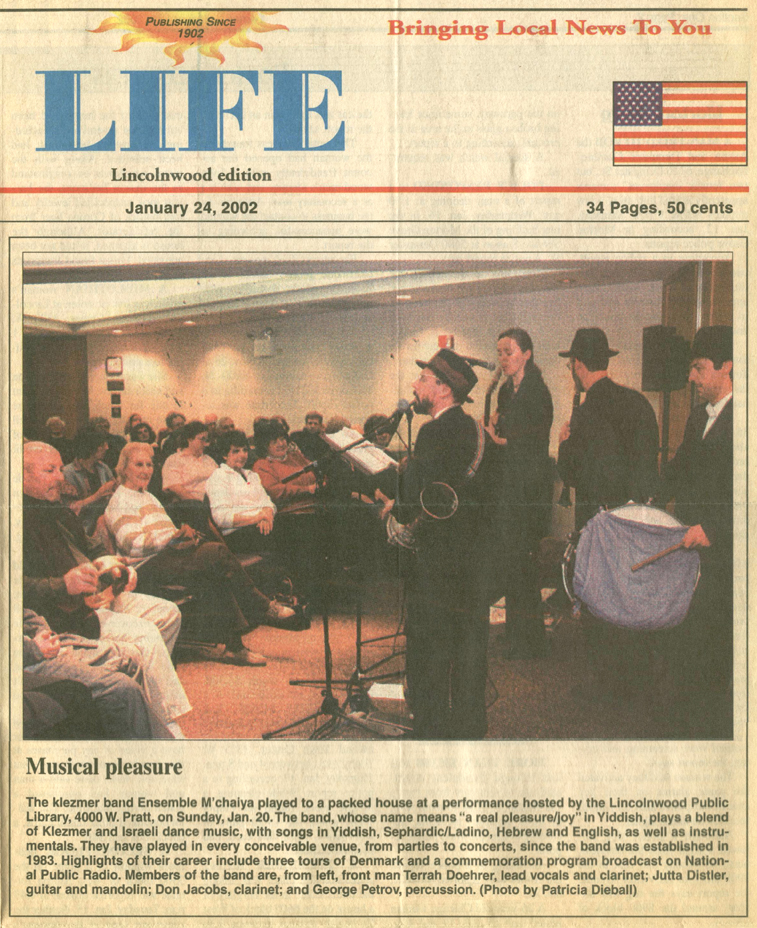
The klezmer band Ensemble M’chaiya (tm) played to a packed house at a performance hosted by the Lincolnwood Public Library, 4000 W. Pratt, on Sunday, Jan. 20. The band, whose name means “a real pleasure/joy” in Yiddish, plays a blend of Klezmer and Israeli dance music, with songs in Yiddish, Sephardic/Ladino, Hebrew, and English, as well as instrumentals. They have played in every conceivable venue, from parties to concerts, since the band was established in 1983. Highlights of their career include three tours of Denmark and a commemoration program broadcast on National Public Radio. Members of the band are, from left, front man Terran Doehrer, lead vocals and kaval; Jutta Distler, guitar and mandolin; Don Jacobs, clarinet; and George Petrov, percussion. (Photo by Patricia Dieball)
Saint Joseph, Indiana Jewish Federation “Our Community News” — December 2003 clipping
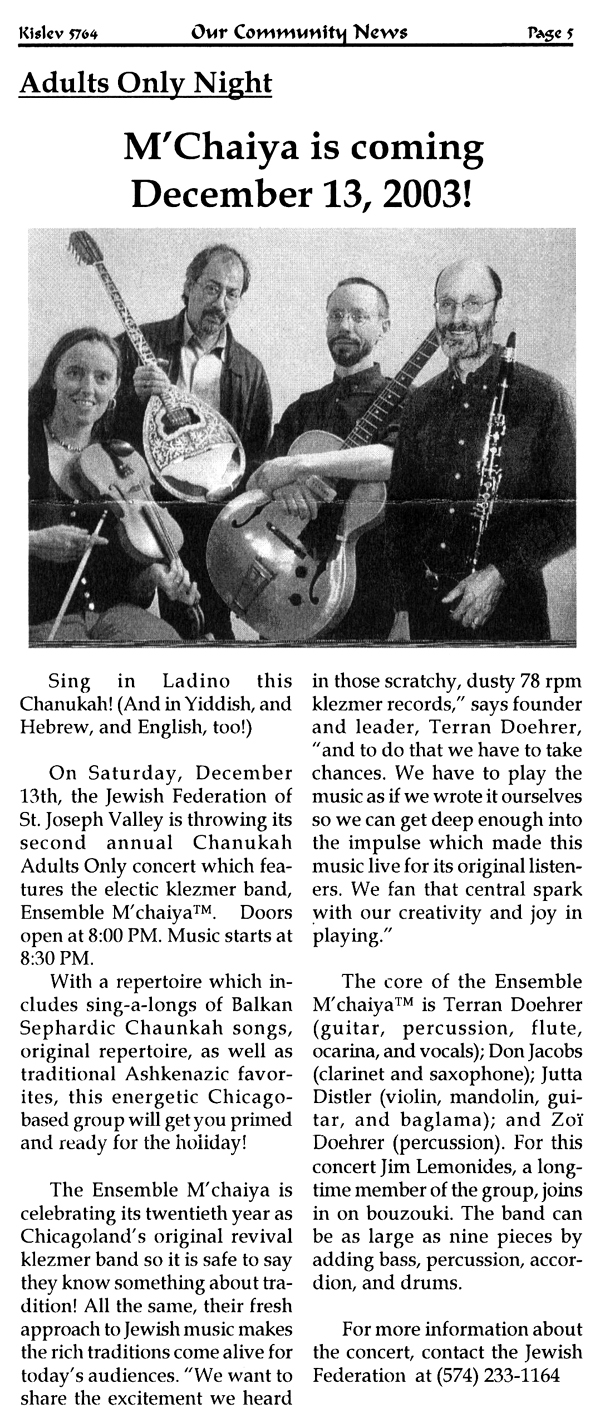
M’chaiya is coming December 13, 2003!
Sing in Ladino this Chanukah! (And in Yiddish, and Hebrew, and English, too!)
On Saturday, December 13th, the Jewish Federation of St. Joseph Valley is throwing its second annual Chanukah Adults Only concert which features the eclectic klezmer band, Ensemble M’chaiya (tm). Doors open at 8:00 PM. Music starts at 8:30 PM.
With a repertoire which includes sing-a-longs of Balkan Sephardic Chanukah songs, original repertoire, as well as traditional Ashkenazic favorites, this energetic Chicago-based group will get you primed and ready for the holiday!
The Ensemble M’chaiya is celebrating its twentieth year as Chicagoland’s original revival klezmer band so it is safe to say they know something about tradition! All the same, their fresh approach to Jewish music makes the rich traditions come alive for today’s audiences. “We want to share the excitement we heard in those scratchy, dusty 78 rpm klezmer records,” says founder and leader, Terran Doehrer, “and to do that we have to take chances. We have to play the music as if we wrote it ourselves so we can get deep enough into the impulse which made this music live for its original listeners. We fan that central spark with our creativity and joy in playing.”
The core of the Ensemble M’chaiya is Terran Doehrer (guitar, percussion, flute, ocarina, and vocals); Don Jacobs (clarinet and saxophone); Jutta Distler (violin, mandolin, guitar, and baglama); and Zoi Doehrer (percussion). For this concert Jim Lemonides, a long-time member of the group, joins in on bouzouki. The band can be as large as nine pieces by adding bass, percussion, accordion, and drums.
For more information about the concert, contact the Jewish Federation at (574) 233-1164.
November 9, 2018 — Chicago Tribune — Evanston Review, From The Community clipping
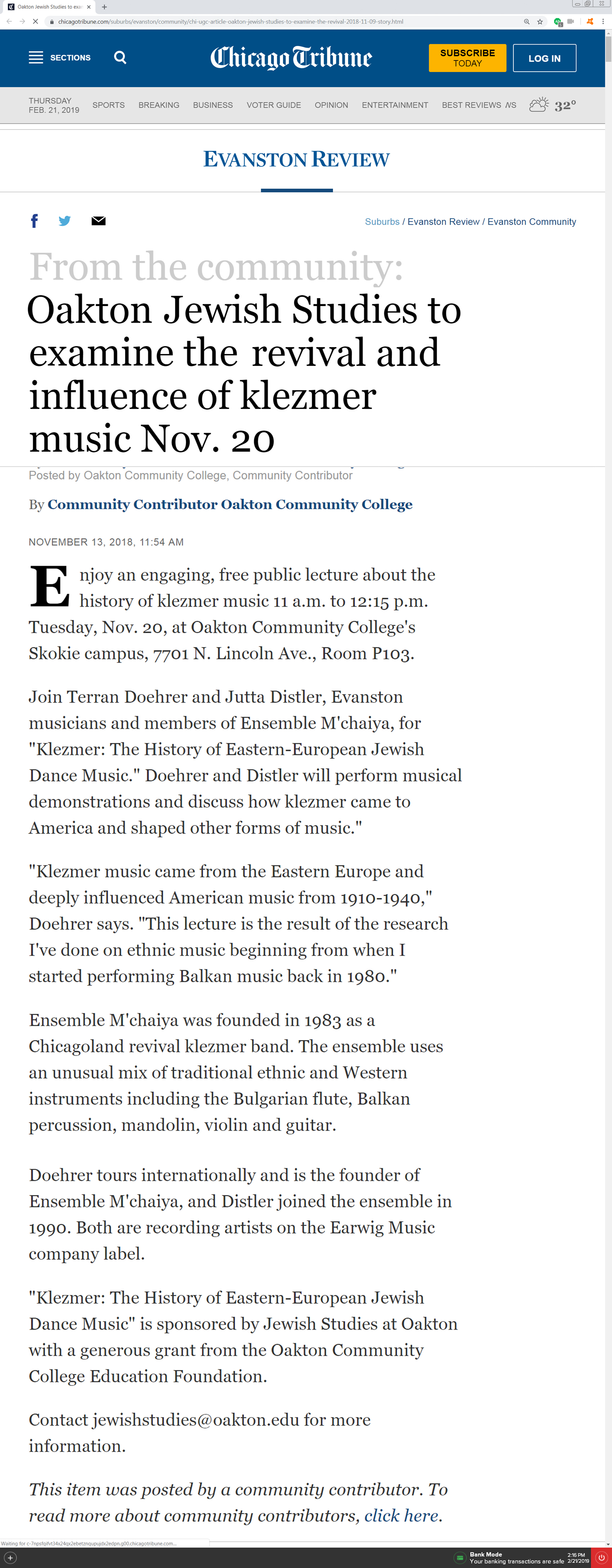
Oakton Jewish Studies to examine the revival and influence of klezmer music Nov. 20
Enjoy an engaging, free public lecture about the history of klezmer music 11 a.m. to 12:15 p.m. Tuesday, Nov. 20, at Oakton Community College’s Skokie campus, 7701 N. Lincoln Ave., Room P103.
Join Terran Doehrer and Jutta Distler, Evanston musicians and members of Ensemble M’chaiya (tm), for “Klezmer: The History of Eastern-European Jewish Dance Music.” Doehrer and Distler will perform musical demonstrations and discuss how klezmer came to America and shaped other forms of music.
“Klezmer music came from the Eastern Europe and deeply influenced American music from 1910-1940,” Doehrer says. “This lecture is the result of the research I’ve done on ethnic music beginning from when I started performing Balkan music back in 1980.“
Ensemble M’chaiya was founded in 1983 as a Chicagoland revival klezmer band. The ensemble uses an unusual mix of traditional ethnic and Western instruments including the Bulgarian flute, Balkan percussion, mandolin, violin and guitar.
Doehrer tours internationally and is the founder of Ensemble M’chaiya, and Distler joined the ensemble in 1990. Both are recording artists on the Earwig Music company label.
“Klezmer: The History of Eastern - European Jewish Dance Music” is sponsored by Jewish Studies at Oakton with a generous grant from the Oakton Community College Education Foundation.
Contact jewishstudies @oakton.edu for more information.
Jewish Federation of Louisville, Kentuck website article, February 24, 2014

M’chaiya Klezmer Band to Play at Anshei Sfard
If you travel over to the Congregation Anshei Sfard on Sunday morning, March 16, you will actually be taking a voyage that goes much farther than that, one that will cover many different countries, from America to Turkey.
Your musical tour guide will be the Chicago-based Klezmer band, the Ensemble M’chaiya (tm), as they perform their unique brand of music at a special, free brunch concert to celebrate the Jewish holiday of Purim.
The community is invited to participate in the Purim services, which begins at 8:30 a.m. Following the reading of the Megillah, around 9:45, everyone can enjoy a free buffet brunch and the concert will begin around 10:30.
With a huge repertoire of music from four different Jewish traditions, this fascinating family band will transport your imagination on an exciting exploration of culture as they get your heart grooving to everything from American Klezmer boogies with a Balkan Gypsy sound to the even more exotic Sephardic Jewish songs. When was the last time you grooved to a fraelach played on a Bulgarian wooden flute or was mesmerized by a Purim piece set in a 12/8 time signature sung in Ladino, the language of the Sephardic Jews? This is clearly a trip worth taking!
This band was formed in 1983 after leader Terran Doehrer first heard Klezmer music at a concert by a band called the Klezmorim on their first trip to Chicago. Doehrer, the founder of the Balkan Rhythm Band (tm), immediately recognized that Klezmer had at least some of its roots in the Balkans. “It is no surprise,” says Doehrer, “that when you run across a Klezmer tune called a ‘Bulgar’ it has some sort of connection to Bulgaria.
Doehrer’s borderless musical curiosity led him to discover a second style of Balkan-influenced Jewish music, that of the Sephardim, the Jews who originated in Spain. Back in 1492, when Queen Isabella and King Ferdinand consolidated their power by marrying, they expelled from Spain all non-Catholics who refused to convert. Some Spanish Jews went eastward along the Mediterranean basin to Greece and other parts of the Balkans as well as to Turkey. Others hopped on the boats that Columbus led that year to the Americas.
“We once met,” says Doehrer, “a woman who claims to be the a descendent of one of Columbus’s navigators!” The Ensemble M’chaiya has a large enough Sephardic repertoire to do concert performances completely in that style, singing in Ladino, French, and Turkish.
“Our Sephardic repertoire is why we initially contacted Congregation Anshei Sfard,” Doehrer pointed out. “Their name, ‘Sfard,’ made me think that they might be interested in our Sephardic music. Turns out that, even though the synagogue no longer has much of a Sephardic membership, happily they decided to invite us to come play for them anyway.”
The Ensemble M’chaiya has an eclectic repertoire of Purim music. Moreover, since the band’s Spring Tour would bring them to Louisville exactly on Purim, Rabbi Golding found to be an opportunity too good to pass up.
Rabbi Golding explained that he decided to make this event a free brunch concert featuring this engaging family band. “The pairing of the band to this event just made sense because Purim is a very family-oriented holiday, with everyone getting to dress up in costume.”
Purim celebrates that fact that Queen Esther and her cousin, Mordechai, were able to save the Jewish people from the extermination called for by Haman. Not much has changed since then as recent history and current events continue to demonstrate.
Thus, Klezmer music and Sephardic music both come out of very hard conditions and resonate from the thousands of years of violent discrimination against the Jewish people. This gives rise to the same sort of searching for meaning and release as you find in American Blues and in the music of the Gypsies, another culture that has wandered the earth playing music, all the while facing extreme oppression, including actual slavery.
“Yet,” reflects Doehrer, “despite all the suffering these various groups have experienced, their cultures have all survived and their musics all share a joyousness and a desire to celebrate life. The result is very, very powerful and very moving.”
You can get a sense of what the band sounds like by visiting their web site, http://www.mchaiya.com
For more information about Purim services and to reserve your spot for this free brunch concert, call the office at 451-3122.
https:// jewishlouisville.org/ mchaiya-klezmer-band- play-anshei-sfard/The Chicago Jewish Star — By Gila Wertheimer, Associate Editor, February 4, 2000 clipping
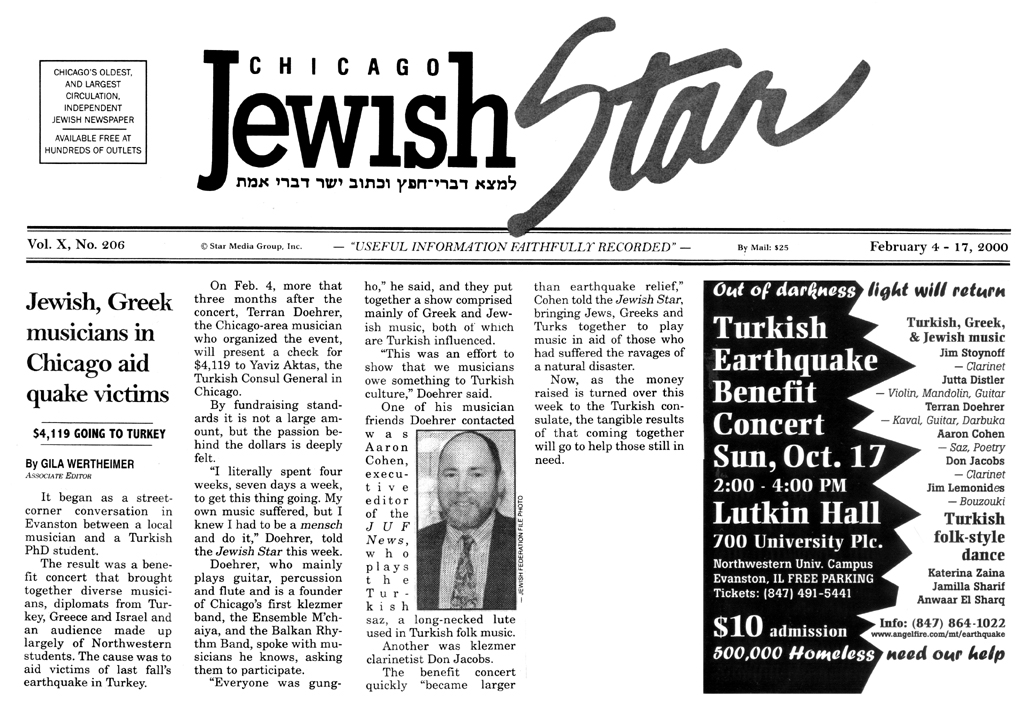
Jewish, Greek musicians in Chicago aid quake victims
It began as a street-corner conversation in Evanston between a local musician and a Turkish PhD student.
The result was a benefit concert that brough together diverse musicians, diplomats from Turkey, Greece, and Israel, and an audience made up largely of Northwestern students. That cause was to aid victims of last fall’s earthquake in Turkey.
On Feb. 4, more than three months after the concert, Terran Doehrer, the Chicago-area musicians who organized the event, will present a check for $4,119 to Yaviz Aktas, the Turkish Counsul General in Chicago.
By fundraising standards it is not a large amount, but the passion behind the dollars is deeply felt.
“I literally spent four weeks, seven days a week, to get this thing going. My own music suffered, but I knew I had to be a mensch and do it,” Doehrer told the Jewish Star this week.
Doehrer, who mainly plays guitar, percussion, and flute and is a founder of Chicago’s first klezmer band, the Ensemble M’chaiya (tm), and the Balkan Rhythm Band (tm), spoke with musicians he knows, asking them to participate.
“Everyone was gung-ho,” he said, and they put together a show comprised mainly of Greek and Jewish music, both of which are Turkish influenced.
“This was an effort to show that we musicians owe something to Turkish culture,” Doehrer said.
One of his musician friends Doehrer contacted was Aaron Cohen, executive editor of the JUF News, who plays the Turkish saz, a long-necked lute used in Turkish folk music.
Another was klezmer clarinetist Don Jacobs.
The benefit concert quickly “became larger than earthquake relief,” Cohen told the Jewish Star, bringing Jews, Greeks, and Turks together to play music in aid of those who had suffered the ravages of a natural disaster.
Now, as the money raised is turned over this week to the Turkish consulate, the tangible results of that coming together will go to help those still in need.
The Chicago Jewish News — Arts & Entertainment — By Pauline Yearwood, Managing Editor, September 3, 1999 clipping
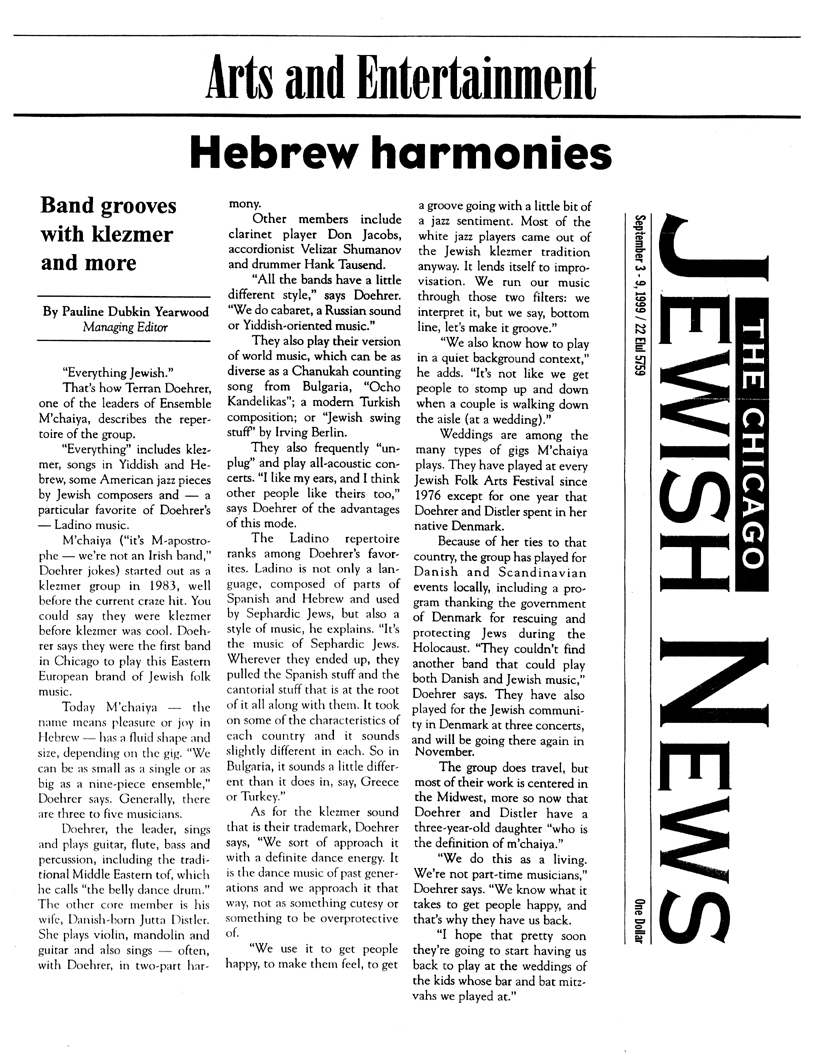
Hebrew harmonies — Band grooves with klezmer and more
“Everything Jewish.”
That’s how Terran Doehrer, one of the leaders of Ensemble M’chaiya (tm) describes the repertoire of the group.
“Everything” includes klezmer, songs in Yiddish and Hebrew, some American jazz pieces by Jewish composers and — a particular favorite of Doehrer’s — Ladino music.
M’chaiya (“it’s M-apostrophe — we’re not an Irish band,” Doehrer jokes) started out as a klezmer group in 1983, well before the current craze hit. You could say they were klezmer before klezmer was cool. Doehrer says they were the first band in Chicago to play this Eastern European brand of Jewish folk music.
Today M’chaiya — the name means pleasure or joy in Hebrew — has a fluid shape and size, depending on the gig. “We can be as small as a single or as big as a nine-piece ensemble,” Doehrer says. Generally, there are three to five musicians.
Doehrer, the leader, sings and plays guitar, flute, bass, and percussion, including the traditional Middle Eastern tof, which he calls “the belly dance drum.” The other core member is his wife, Danish-born Jutta Distler. She plays violin, mandolin, and guitar and also sings — often, with Doehrer, in two-part harmony.
Other members include clarinet player Don Jacobs, accordionist Velizar Shumanov, and drummer Hank Tausend.
“All the bands have a little different style,” says Doehrer. “We do [Gypsy and Sephardic styled] music.“ {Editor’s note: bracketed material corrects material errors in the article.}
They also play their version of world music, which can be as diverse as a Chanukah counting song from Bulgaria, “Ocho Kandelikas”; a modern Turkish composition; or “Jewish swing stuff” by Irving Berlin.
They also frequently “unplug” and play all-acoustic concerts. “I like my ears, and I think other people like theirs too,” says Doehrer of the advantages of this mode.
The Ladino repertoire ranks among Doehrer’s favorites. Ladino is not only a language, composed of part of Spanish and Hebrew and used by Sephardic Jews but also a style of music, he explains. “It’s the music of Sephardic Jews. Wherever they ended up, they pulled the Spanish stuff and the cantorial stuff that is at the root of it all along with them. It took on some of the characteristics of each country and it sounds slightly different in each. So in Bulgaria, it sounds a little different than it does in, say, Greece or Turkey.”
As for the klezmer sound that is their trademark, Doehrer says, “We sort of approach it with a definite dance energy. It is the dance music of past generations and we approach it that way, not as something cutesy or something to be overprotective of.
“We use it to get people happy, to make them feel, to get them a groove going with a little bit of a jazz sentiment. [Many] of the white jazz players came out of the Jewish klezmer tradition anyway. It lends itself to improvisation. We run our music through those two filters: we interpret it, but we say, bottom line, let’s make it groove.”
“We also know how to play in a quiet background context,” he adds. “It’s not like we get people to stomp up and down when a couple is walking down the aisle (at a wedding).”
Weddings are among the many types of gigs M’chaiya plays. They have played at every Jewish Folk Arts Festival since 1976 except for one year that Doehrer and Distler spent in her native Denmark.
Because of her ties to that country, the group has played for Danish and Scandinavian events locally, including a program thanking the government of Denmark for rescuing and protecting Jews during the Holocaust. “They couldn’t find another band that could play both Danish and Jewish music,” Doehrer says. They have also played for the Jewish community in Denmark at three concerts, and will be going there again in November.
The group does travel, but most of their work is centered in the Midwest, more so now that Doehrer and Distler have a three-year-old daughter “who is the definition of m’chaiya.”
“We do this as a living. We’re not part-time musicians,” Doehrer says. “We know what it takes to get people happy, and that’s why they have us back.
“I hope that pretty soon they’re going to start having us back to play at the weddings of the kids whose bar and bat mitzvahs we played at.”
Jewish Forward — Calendar, November 14, 2003 clipping
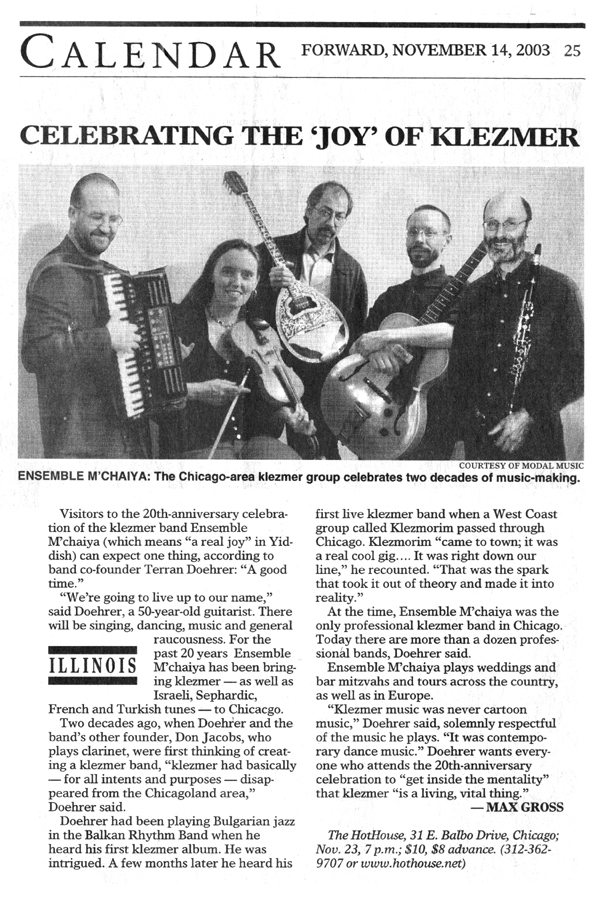
Celebrating the ‘Joy’ of Klezmer
Visitors to the 20th-anniversary celebration of the klezmer band Ensemble M’chaiya (tm) (which means a “a real joy” in Yiddish) can expect one thing, according to band co-founder Terran Doehrer: “A good time.”
“We’re going to live up to our name,” said Doehrer, a 50-year-old guitarist. There will be singing, dancing, music, and general raucousness. For the past 20 years Ensemble M’chaiya has been bringing klezmer — as well as Israeli, Sephardic, French, and Turkish tunes — to Chicago.
Two decades ago, when Doehrer and the band’s other founder, Don Jacobs, who plays clarinet, were first thinking of creating a klezmer band, “klezmer had basically — for all intents and purposes — disappeared from the Chicagoland area,” Doehrer said.
Doehrer had been playing Bulgarian jazz in the Balkan Rhythm Band (tm) when he heard his first klezmer album. He was intrigued. A few months later he heard his first live klezmer band when a West Coast group called Klezmorim “came to town; it was a real cool gig. … It was right down our line,” he recounted. “That was the spark that took it out of theory and made it into reality.”
At the time, Ensemble M’chaiya was the only professional klezmer band in Chicago. Today there are more than a dozen professional bands, Doehrer said.
Ensemble M’chaiya plays weddings and bar mitzvahs and tours across the country, as well as in Europe.
“Everyone was gung-ho,” he said, and they put together a show comprised mainly of Greek and Jewish music, both of which are Turkish influenced.
“Klezmer music was never cartoon music,” Doehrer said, solemnly respectful of the music he plays. “It was contemporary dance music.” Doehrer wants everyone who attends the 20th-anniversary celebration to “get inside the mentality” that klezmer “is a living, vital thing.”
— MAX GROSS
Evanston Round Table — Art and Life section, by Victoria Scott, December 3, 2003 clipping
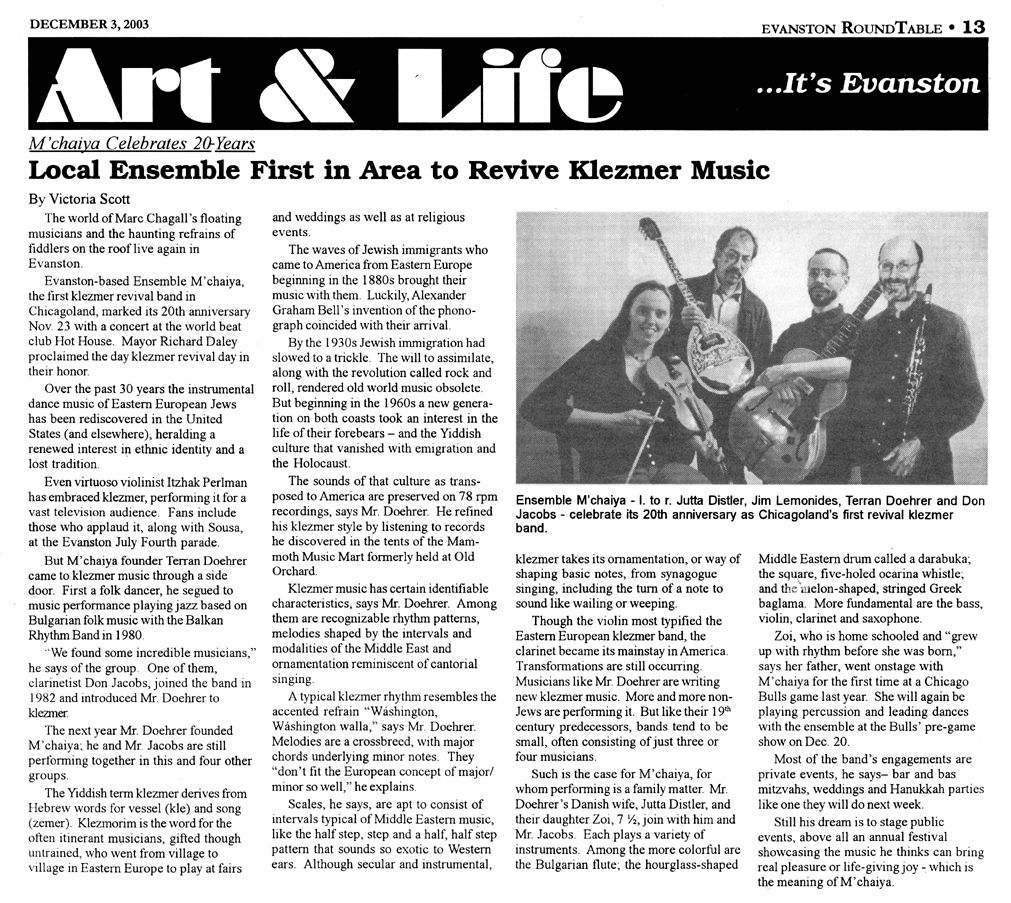
Local Ensemble First in Area to Revive Klezmer Music
The world of Marc Chagall’s floating musicians and the haunting refrains of fiddlers on the roof live again in Evanston.
Evanston-based Ensemble M’chaiya, the first klezmer revival band in Chicagoland, marked its 20th anniversary Nov. 23 with a concert at the world beat club Hot House. Mayor Richard Daley proclaimed the day klezmer revival day in their honor.
Over the past 30 years the instrumental dance music of Eastern European Jews has been rediscovered in the United States (and elsewhere), heralding a renewed interest in ethnic identity and a lost tradition.
Even virtuoso violinist Itzhak Perlman has embraced klezmer, performing it for a vast television audience. Fans include those who applaud it, along with Sousa, at the Evanston July Fourth parade.
But M’chaiya founder Terran Doehrer came to klezmer music through a side door. First a folk dancer, he segued to music performance playing jazz based on Bulgarian folk music with the Balkan Rhythm Band in 1980.
“We found some incredible musicians,” he says of the group. One of them, clarinetist Don Jacobs, joined the band in 1982 and introduced Mr. Doehrer to klezmer.
The next year Mr. Doehrer founded M’chaiya; he and Mr. Jacobs are still performing together in this and four other groups.
The Yiddish term klezmer derives from Hebrew words for vessel (kle) and song (zemer). Klezmorim is the word for the often itinerant musicians, gifted though untrained, who went from village to village in Eastern Europe to play at fairs and weddings as well as at religious events.
The waves of Jewish immigrants who came to America from Eastern Europe beginning in the 1880s brought their music with them. Luckily, Alexander Graham Bell’s invention of the phonograph coincided with their arrival.
By the 1930s Jewish immigration had slowed to a trickle. The will to assimilate, along with the revolution called rock and roll, rendered old world music obsolete. But beginning in the 1960s a new generation on both coasts took an interest in the life of their forebears – and the Yiddish culture that vanished with emigration and the Holocaust.
The sounds of that culture as transposed to America are preserved on 78 rpm recordings, says Mr. Doehrer. He refined his klezmer style by listening to records he discovered in the tents of the Mammoth Music Mart formerly held at Old Orchard.
Klezmer music has certain identifiable characteristics, says Mr. Doehrer. Among them are recognizable rhythm patterns, melodies shaped by the intervals and modalities of the Middle East and ornamentation reminiscent of cantorial singing.
A typical klezmer rhythm resembles the accented refrain “Washington, Washington walla,” says Mr. Doehrer. Melodies are a crossbreed, with major chords underlying minor notes. They “don’t fit the European concept of major / minor so well,” he explains.
Scales, he says, are apt to consist of intervals typical of Middle Eastern music, like the half step, step and a half, half step pattern that sounds so exotic to Western ears. Although secular and instrumental, klezmer takes its ornamentation, or way of shaping basic notes, from synagogue singing, including the turn of a note to sound like wailing or weeping.
Though the violin most typified the Eastern European klezmer band, the clarinet became its mainstay in America.
Transformations are still occurring. Musicians like Mr. Doehrer are writing new klezmer music. More and more non-Jews are performing it. But like their 19th century predecessors, bands tend to be small, often consisting of just three or four musicians.
Such is the case for M’chaiya, for whom performing is a family matter. Mr. Doehrer’s Danish wife, Jutta Distler, and their daughter Zoi, seven, join with him and Mr. Jacobs. Each plays a variety of instruments. Among the more colorful are the Bulgarian flute; the hourglass-shaped Middle Eastern drum called a darabuka; the square, five-holed ocarina whistle; and the melon-shaped, stringed Greek baglama. More fundamental are the bass, violin, clarinet and saxophone.
Zoi, who is home schooled and “grew up with rhythm before she was born,” says her father, went onstage with M’chaiya for the first time at a Chicago Bulls game last year. She will again be playing percussion and leading dances with the ensemble at the Bulls’ pre-game show on Dec. 20.
Most of the band’s engagements are private events, he says” bar and bas mitzvahs, weddings and Hanukkah parties like one they will do next week.
Still his dream is to stage public events, above all an annual festival showcasing the music he thinks can bring real pleasure or life-giving joy — which is the meaning of M’chaiya.
Evanston Round Table — Arts and Entertainment section, by Pauline Dubkin Yearwood, Managing Editor, November 14, 2003 clipping
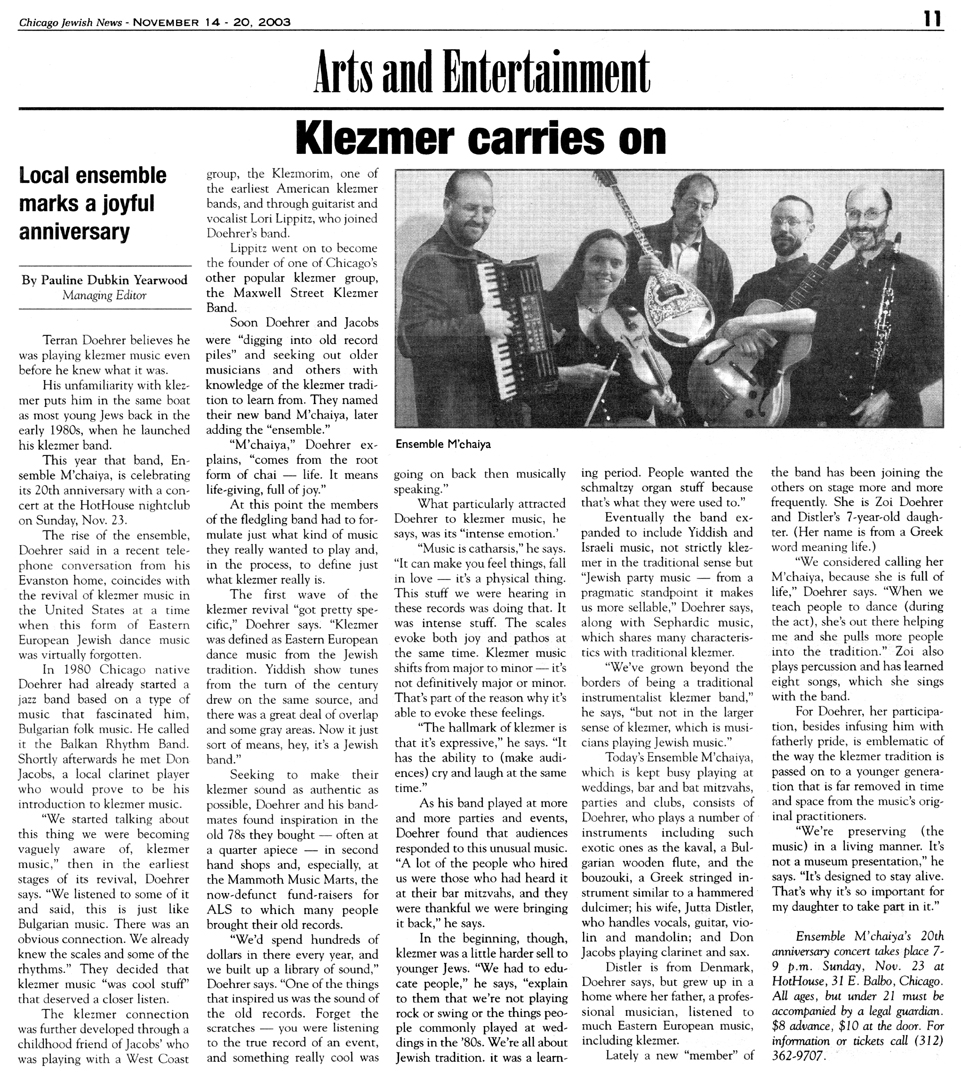
Klezmer carries on
Local ensemble marks a joyful anniversary
Terran Doehrer believes he was playing klezmer music even before he knew what it was.
His unfamiliarity with klezmer puts him in the same boat as most young Jews back in the early 1980s when he launched his klezmer band.
This year that band, the Ensemble M’chaiya (tm), is celebrating its 20th anniversary with a concert at the HotHouse nightclub on Sunday, Nov. 23.
The rise of the ensemble, Doehrer said in a recent telephone conversation from his Evanston home, coincides with the revival of klezmer music in the United States at a time when this form of Eastern European Jewish dance music was virtually forgotten.
In 1980 Chicago native Doehrer had already started a jazz band based on a type of music that fascinated him, Bulgarian folk music. He called it the Balkan Rhythm Band (tm). Shortly afterwards he met Don Jacobs, a local clarinet player who would prove to be his introduction to klezmer music.
“We started talking about this thing we were becoming vaguely aware of, klezmer music,” then in the earliest stages of its revival, Doehrer says. “We listened to some of it and said, this is just like Bulgarian music. There was an obvious connection. We already knew the scales and some of the rhythms.” They decided that klezmer music “was cool stuff” that deserved a closer listen.
The klezmer connection was further developed through a childhood friend of Jacobs’ who was playing with a West Coast group, the Klezmorim, one of the earliest American klezmer bands, and through guitarist and vocalist Lori Lippitz, who joined Doehrer’s band. [Editor’s correction: Doehrer and Jacobs had already heard the Klezmorim and were actively practicing the musical style when Mz Lippitz joined the Ensemble M’chaiya.]
Lippitz went on to become the founder of one of Chicago’s other popular klezmer group, the Maxwell Street Klezmer Band.
Soon Doehrer and Jacobs were “digging into old record piles” and seeking out older musicians and others with knowledge of the klezmer tradition to learn from. They named their new band M’chaiya, later adding the “ensemble.”
“M’chaiya,” Doehrer explains, “comes from the root form of chai — life. It means live-giving, full of joy.”
At this point the members of the fledgling band had to formulate just kind of music they really wanted to play and, in the process, to define just what klezmer really is.
The first wave of the klezmer revival “got pretty specific,” Doehrer says. “Klezmer was defined as Eastern European dance music from the Jewish tradition. Yiddish show tunes from the turn of the century drew on the same source, and there was a great deal of overlap and some gray areas. Now it just sort of means, hey, it’s a Jewish band.”
Seeking to make their klezmer sound as authentic as possible, Doehrer and his bandmates found inspiration in the old 78s they bought — often at a quarter apiece — in second hand shops and, especially, at the Mammoth Music Marts, the now-defunct fund-raisers for ALS to which many people brought their old records.
“We’d spend hundreds of dollars in there every year, and we built up a library of sound,” Doehrer says. “One of the things that inspired us was the sound of the old records. Forget the scratches — you were listening to the true record of an event, and something really cool was going on back then musically speaking.”
What particularly attracted Doehrer to klezmer music, he says, was its “intense emotion.”
“Music is catharsis,” he says. “It can make you feel things, fall in love — it’s a physical thing. This stuff we were hearing in these records was doing that. It was intense stuff. The scales evoke both joy and pathos at the same time. Klezmer music shifts from major to minor — it’s able to evoke these feelings.
“The hallmark of klezmer is that it’s expressive,” he says. “It has the ability to (make audiences) cry and laugh at the same time.”
As his band played at more and more parties and events, Doehrer found that audiences responded to this unusual music. “A lot of the people who hired us were those who had heard it at their bar mitzvahs, and they were thankful we were bringing it back,” he says.
In the beginning, though, klezmer was a little harder to sell to younger Jews. “We had to educate people,” he says, “explain to them that we’re not playing rock or swing or the things people commonly played at wedding in the ’80s. We’re all about Jewish tradition. It was a learning period. People wanted the schmaltzy organ stuff because that’s what they were used to.”
Eventually the band expanded to include Yiddish and Israeli music, not strictly klezmer in the traditional sense but “Jewish party music — from a pragmatic standpoint it makes us more sellable,” Doehrer says, along with Sephardic music, which shares many characteristics with traditional klezmer.
“We’ve grown beyond the borders of being a traditional instrumentalist klezmer band,” he says, “but not in the larger sense of klezmer, which is musicians playing Jewish music.”
Today’s Ensemble M’chaiya, which is kept busy playing at weddings, bar and bat mitzvahs, parties, and clubs, consists of Doehrer, who plays a number of instruments including such exotic ones as the kaval, a Bulgarian wooden flute, and the bouzouki, a Greek stringed instrument similar to a hammered dulcimer; his wife, Jutta Distler, who handles vocals, guitar, violin, and mandolin; and Don Jacobs playing clarinet and sax. [Editor’s correction: Doehrer also plays hand percussion while occasional band member Jim Lemonides plays the bouzouki is actually in the lute family, played with a plectrum, not hammers.]
Distler is from Denmark, Doehrer says, but grew up in a home where her father, a professional musician, listened to much Eastern European music, including klezmer. [Editor’s correction: Mr Distler was a teacher and an amateur musician]
Lately, a new “member” of the band has been joining the others on stage more and more frequently. She is Zoi, Doehrer’s and Distler’s 7-year-old daughter. (Her name is from a Greek word meaning life.)
“We considered calling her M’chaiya, because she is full of life,” Doehrer says. “When we teach people to dance (during the act), she’s out there helping me and she pulls more people into the tradition.” Zoi also plays percussion and has learned eight songs which she sings with the band.
For Doehrer, her participation, besides infusing him with fatherly pride, is emblematic of the way the klezmer tradition is passed on to a younger generation that is far removed in time and space from the music’s original practitioners.
“We’re preserving (the music) in a living manner. It’s not a museum presentation,” he says. “it’s designed to stay alive. That’s why it’s so important for my daughter to take part in it.”
Ensemble M’chaiya’s 20th anniversary concert takes place 7-9 p.m. Sunday, Nov. 23rd at HotHouse, 31 E. Balbo, Chicago. All ages, but under 21 must be accompanied by a legal guardian. $8 advance, $10 at the door. For information or tickets call (312) 362-9707.
Chicago Jewish Star, November 12, 2004 clipping
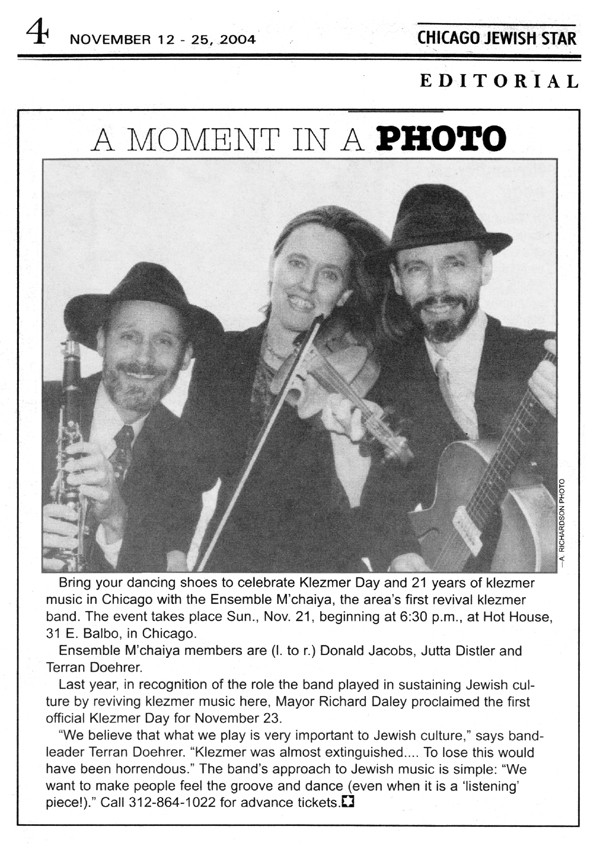
A Moment In A Photo — EDITORIAL
Bring your dancing shoes to celebrate Klezmer Day and 21 years of klezmer music in Chicago with the Ensemble M’chaiya, the area’s first revival klezmer band. The event takes place Sun., Nov. 21, beginning at 6:30 p.m., at Hot House, 31 E. Balbo, in Chicago.
Ensemble M’chaiya members are (l. to r.) Donald Jacobs, Jutta Distler, and Terran Doehrer.
Last year, in recognition of the role the band played in sustaining Jewish culture by reviving klezmer music here, Mayor Richard Daley proclaimed the first official Klezmer Day for November 23rd.
“We believe that what we play is very important to Jewish culture,” says bandleader Terran Doehrer. ”Klezmer was almost extinguished … To lose this would have been horrendous.“ The band‘s approach to Jewish music is simple: ”We want to make people feel the groove and dance (even when it is a ‘listening’ piece!).” Call 312-864-1022 for advance tickets.
Flexible and affordable
We fit the band’s size to your budget, needs, and interests.
